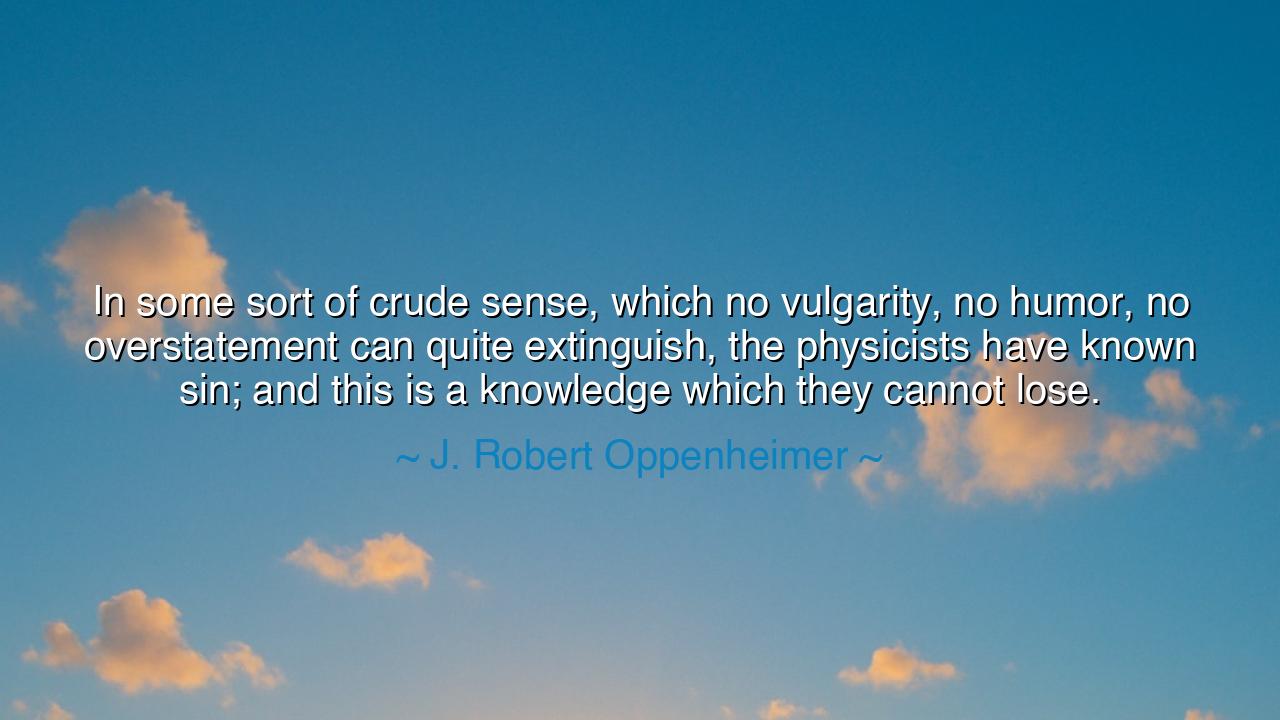
In some sort of crude sense, which no vulgarity, no humor, no
In some sort of crude sense, which no vulgarity, no humor, no overstatement can quite extinguish, the physicists have known sin; and this is a knowledge which they cannot lose.






When J. Robert Oppenheimer said, “In some sort of crude sense, which no vulgarity, no humor, no overstatement can quite extinguish, the physicists have known sin; and this is a knowledge which they cannot lose,” he revealed a profound truth about human responsibility, knowledge, and moral awakening. Born from the crucible of the atomic age, Oppenheimer spoke not only of science, but of conscience. To “know sin” in this context is to understand the consequences of one’s actions in the deepest possible sense — the capacity for creation that can also bring destruction. Humor, rhetoric, or denial cannot erase the weight of such awareness. This is the eternal burden and privilege of those who wield knowledge.
The ancients would have recognized this insight as the paradox of power and wisdom. Prometheus, who stole fire from the gods, knew both the thrill of creation and the pain of consequence. To bring light to the world was also to invite suffering and punishment. In Oppenheimer’s reflection, the physicists are modern Prometheans: they brought the power of the atom into human hands, knowing, in the depths of their consciousness, the potential for unimaginable destruction. Knowledge, in this sense, is inseparable from moral responsibility; it cannot be undone, nor forgotten.
Oppenheimer’s words emerged from history itself. As the scientific director of the Manhattan Project, he oversaw the creation of the first atomic bomb. When it was tested in the New Mexico desert, he famously recalled a line from the Bhagavad Gita: “Now I am become Death, the destroyer of worlds.” In that moment, he glimpsed the duality of knowledge: the power to illuminate and the power to annihilate. He understood, as he later confessed, that no amount of humor or casual discourse could lessen the moral gravity of that act. The physicists’ knowledge of sin was indelible, etched into their conscience forever.
This awareness is not limited to scientists alone. Throughout history, men and women who have glimpsed the consequences of their actions have carried similar burdens. Consider Leo Tolstoy, who, through his writing, came to understand the suffering of the innocent in war and human greed. Like Oppenheimer, Tolstoy recognized that knowledge brings responsibility: once seen, the world’s suffering cannot be unseen. This is the essence of Oppenheimer’s warning — that insight, once gained, is inseparable from moral awareness.
The quote also highlights the limitations of human coping mechanisms. Humor, vulgarity, or exaggeration cannot erase profound moral truths. These are but temporary shields, inadequate against the weight of responsibility. The physicists, in their pursuit of knowledge, confronted an ethical horizon that defied relief or escape. Like the ancient tragedians who showed kings and heroes falling under the inexorable weight of fate, Oppenheimer reminds us that awareness of harm — knowledge of sin — endures beyond mitigation or rationalization.
Yet there is a lesson in this enduring burden. Knowledge and conscience, though heavy, are also what make humans capable of reflection, growth, and ethical action. The awareness of potential harm instills humility and vigilance. The ancients taught that wisdom is inseparable from ethical responsibility: to know is to be accountable, to understand is to act with care. Oppenheimer’s physicists, having touched the edge of destruction, could no longer act lightly; their insight compelled them toward contemplation and moral reckoning.
The lesson, then, is timeless: with great knowledge comes inescapable responsibility. One cannot unlearn the consequences of creation, nor diminish the impact of awareness. To act with insight is to carry the weight of potential harm and the opportunity for good. Humor may soften life’s difficulties, but it cannot absolve conscience. Ethical reflection is a constant companion of those who seek truth, just as it was for the physicists of the atomic age.
In practical terms, this means cultivating mindfulness in pursuit of knowledge and skill. Observe the potential consequences of your actions, reflect upon ethical dimensions, and act with humility and care. Recognize that insight into harm is not a curse, but a call to moral vigilance. As J. Robert Oppenheimer teaches, profound understanding carries a weight that cannot be erased, but in embracing it, one honors the sacred responsibility of human intellect, shaping the world with both awareness and conscience.






AAdministratorAdministrator
Welcome, honored guests. Please leave a comment, we will respond soon